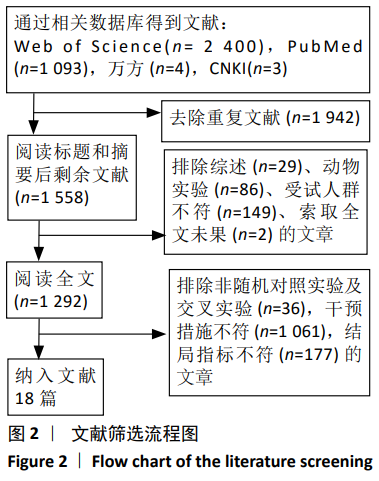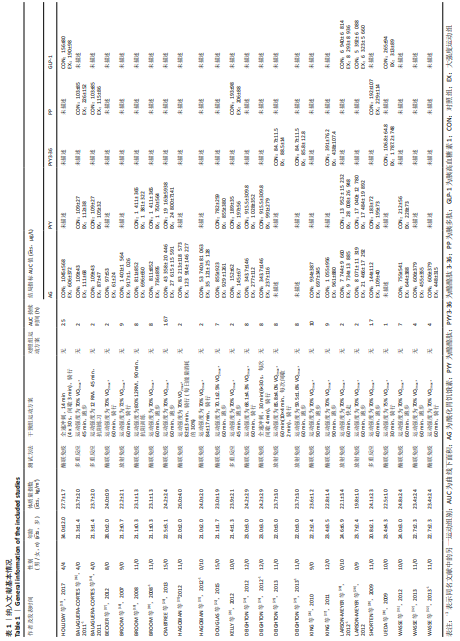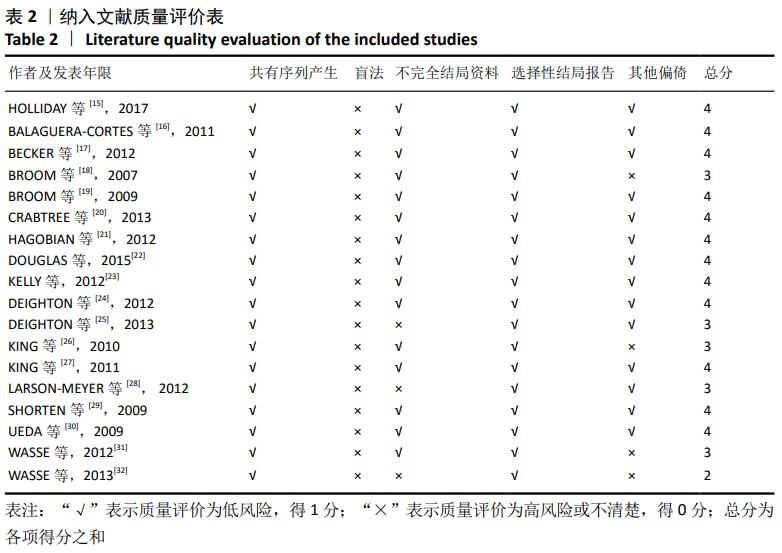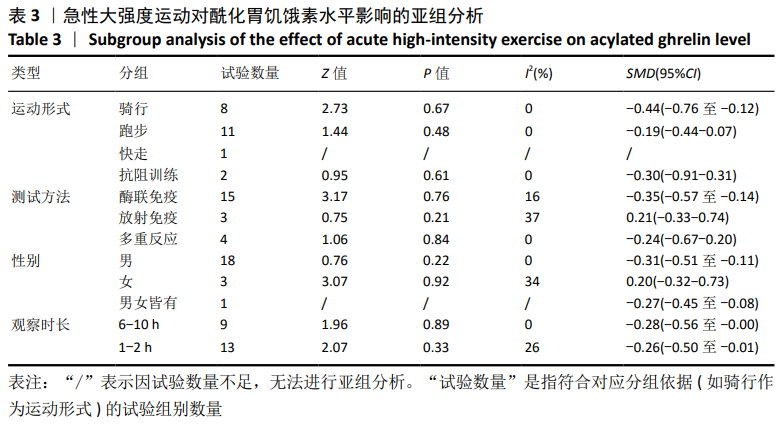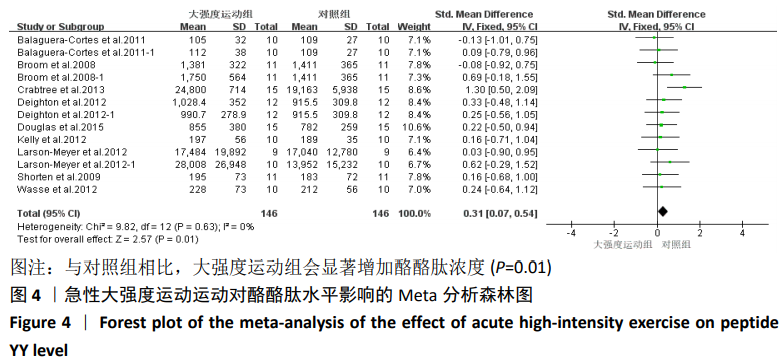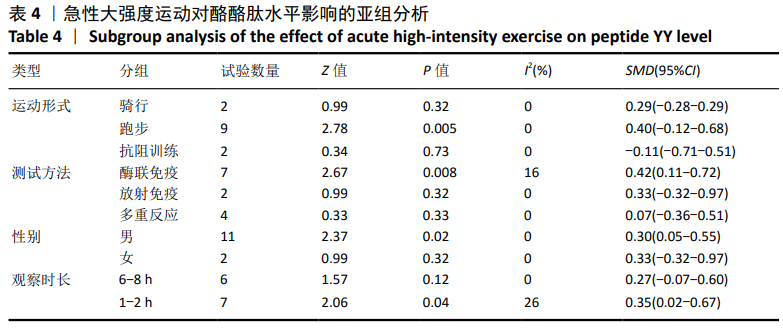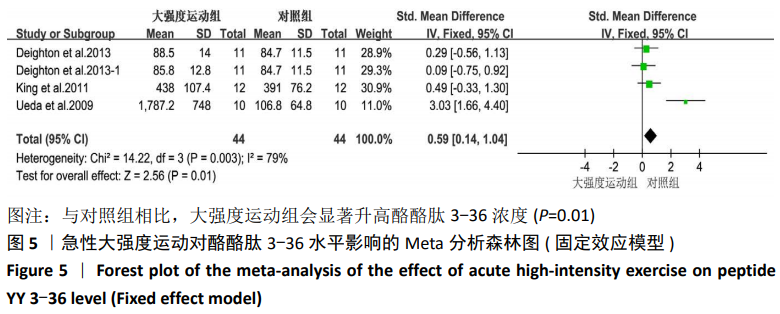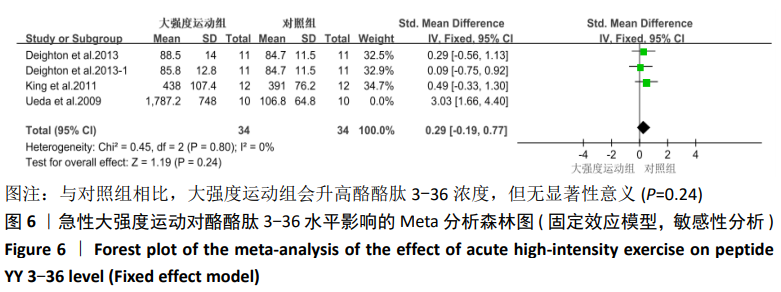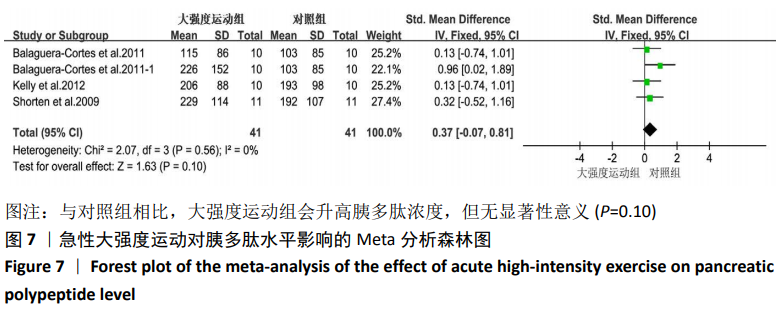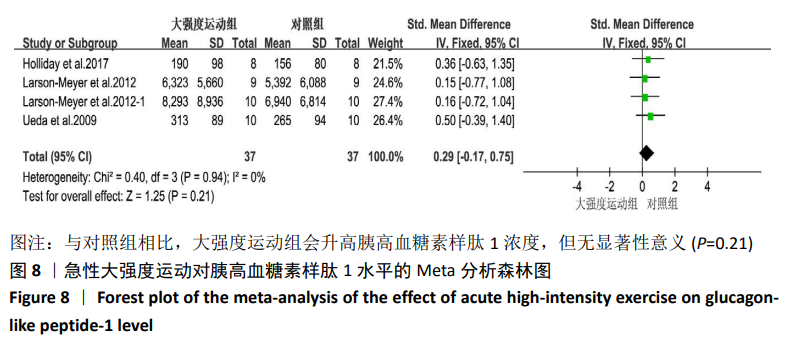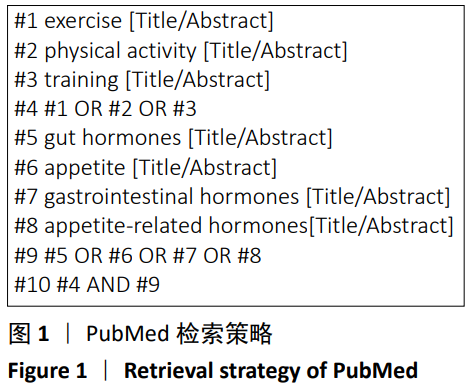[1] KARRA E, BATTERHAM RL. The role of gut hormones in the regulation of body weight and energy homeostasis. Mol Cell Endocrinol. 2010;316(2):120-128.
[2] FALKEN Y, WEBB DL, ABRAHAM-NORDLING M, et al. Intravenous ghrelin accelerates postoperative gastric emptying and time to first bowel movement in humans. Neurogastroent Motil. 2013;25(6):474-480.
[3] KOJIMA M, HOSODA H, DATE Y, et al. Ghrelin is a growth-hormone-releasing acylated peptide from stomach. Nature. 1999;402(6762):656-660.
[4] CUMMINGS DE, WEIGLE DS, FRAYO RS, et al. Plasma ghrelin levels after diet-induced weight loss or gastric bypass surgery. N Engl J Med. 2004;346(21):1623-1630.
[5] THACKRAY AE, DEIGHTON K, KING JA, et al. Exercise, appetite and weight control: are there differences between men and women. Nutrients. 2016;8(9):583-600.
[6] SCHUBERT MM, SABAPATHY S, LEVERITT M, et al. Acute exercise and hormones related to appetite regulation:a meta-analysis. Sports Med. 2014;44(3):387-403.
[7] 吴娜娜,王茹,王雪强,等.急性运动成年人血浆胃肠激素肽水平变化的Meta分析[J].中国组织工程研究, 2015,19(15):2455-2460.
[8] KING NA, BURLEY VJ, BLUNDELL JE, et al. Exercise-induced suppression of appetite: Effects on food intake and implications for energy balance. Eur J Clin Nutr. 1994; 48(10):715-724.
[9] KING NA, BLUNDELL JE. High-fat foods overcome the energy expenditure induced by high intensity cycling or running. Eur J Clin Nutr. 1995;49(2):114-123.
[10] KING JA, WASSE LK, STENSEL DJ. Acute exercise increases feeding latency in healthy normal weight young males but does not alter energy intake. Appetite. 2013;61(1): 45-51.
[11] BLUNDELL JE, KING NA. Exercise,appetite control, and energy balance. Nutrition. 2000;16(7):519-522.
[12] KING JA, WASSE LK, BROOM DR, et al. Influence of brisk walking on appetite, energy intake, and plasma acylated ghrelin. Med Sci Sports Exerc. 2010;42(3):485-492.
[13] 冯连世.优秀运动员身体机能的评定方法[M].北京:人民体育出版社,2003: 109-111.
[14] 上官若男,苏全生,尚画雨,等.运动负荷强度与运动疲劳程度量化分级研究进展[J].中国康复医学杂志,2013,28(2): 188-192.
[15] HOLLIDAY A, BLANNIN AK. Very low volume sprint interval exercise suppresses subjective appetite, lowers acylated ghrelin, and elevates GLP-1 in overweight individuals: a pilot study. Nutrients. 2017; 9(4):362-376.
[16] BALAGUERA-CORTES L, WALLMAN KE, FAIRCHILD TJ, et al. Energy intake and appetite-related hormones following acute aerobic and resistance exercise. Appl Physiol Nutr Metab. 2011;36(6):958-966.
[17] BECKER GF, MACEDO RC, CUNHA GDOS S, et al. Combined effects of aerobic exercise and high-carbohydrate meal on plasma acylated ghrelin and levels of hunger. Appl Physiol Nutr Metab. 2012;37(1):184-192.
[18] BROOM DR, STENSEL DJ, BISHOP NC, et al. Exercise-induced suppression of acylated ghrelin in humans. J Appl Physiol. 2007;102(6):2165-2171.
[19] BROOM DR, BATTERHAM RL, KING JA, et al. Influence of resistance and aerobic training on hunger, circulating levels of acylated ghrelin, and peptide YY in healthy males. Am J Physiol Regul Integr Comp Physiol. 2009;296(1):29-35.
[20] Crabtree DR, Chambers ES, Hardwick RM, et al. The effects of high-intensity exercise on neural responses to images of food. Am J Clin Nutr. 2014;99(2):258-267.
[21] HAGOBIAN TA, YAMASHIRO M, HINKEL-LIPSKER J, et al. Effects of acute exercise on appetite hormones and ad libitum energy intake in men and women. Appl Physiol Nutr Metab. 2013;38(1):66-72.
[22] DOUGLAS JA, KING JA, MCFARLANE E, et al. Appetite, appetite hormone and energy intake responses to two consecutive days of aerobic exercise in healthy young men. Appetite. 2015;92:57-65.
[23] KELLY P J, GUELFI K J, IMAN KE, et al. Mild dehydration does not reduce postexercise appetite or energy intake. Med Sci Sports Exerc. 2012;44(3):516-524.
[24] DEIGHTON K, BARRY R, CONNON CE, et al. Appetite gut hormone and energy intake responses to low volume sprint interval and traditional endurance exercise. Eur J Appl Physiol. 2013;113(5):1147-1156.
[25] DEIGHTON K, KARRA E, BATTERHAM RL. Appetite, energy intake, and PYY3-36 responses to energy-matched continuous exercise and submaximal high-intensity exercise. Appl Physiol Nutr Metab. 2013; 38(9):947-952.
[26] KING JA, MIYASHITA M, WASSE LK, et al. Influence of prolonged treadmill running on appetite, energy intake and circulating concentrations of acylated ghrelin. Appetite. 2010;54(3):492-498.
[27] KING JA, WASSE LK, EWENS J, et al. Differential acylated ghrelin, peptide YY3-36,appetite, and food intake responses to equivalent energy deficits created by exercise and food restriction. J Clin Endocrinol Metab. 2011;96(4):1114-1121.
[28] LARSON-MEYER DE, PALM S, BANSAL A, et al. Influence of running and walking on hormonal regulators of appetite in women. J Obes. 2012;5:15-31.
[29] SHORTEN AL, WALLMAN KE, GUELFI KJ. Acute effect of environmental temperature during exercise on subsequent energy intake in active men. Am J Clin Nutr. 2009; 90(5):1215-1221.
[30] Ueda SY, Yoshikawa T, Katsura Y, et al. Comparable effects of moderate intensity exercise on changes in anorectic gut hormone levels and energy intake to high intensity exercise. J Endocrinol. 2009;203(3):357-364.
[31] WASSE LK, SUNDERLAND C, KING JA, et al. Influence of rest and exercise at a simulated altitude of 4,000 m on appetite, energy intake, and plasma concentrations of acylated ghrelin and peptide YY. J Appl Physiol. 2012;112(4):552-559.
[32] WASSE LK, SUNDERLAND C, KING JA, et al. The influence of vigorous running and cycling exercise on hunger perceptions and plasma acylated ghrelin concentrations in lean young men. Appl Physiol Nutr Metab. 2013;38(1):1-6.
[33] MURPHY KG, DHILLO WS, BLOOM SR. Gut peptides in the regulation of food intake and energy homeostasis. Endocr Rev. 2006; 27(7):719-727.
[34] LAURSEN TL, ZAK RB, SHUTE RJ, et al. Leptin, adiponectin, and ghrelin responses to endurance exercise in different ambient conditions. Temperature. 2017;4(2): 166-175.
[35] HUNSCHEDE S, KUBANT R, AKILen R, et al. Decreased appetite after high-intensity exercise correlates with increased plasma interleukin-6 in normal-weight and overweight/obese boys. Curr Dev Nutr. 2017;1(3):e000398.
[36] DOUGLAS JA, KING JA, CLAYTON DJ, et al. Acute effects of exercise on appetite,ad libitum energy intake and appetite regulatory hormones in lean and overweight/obese men and women. Int J Obes (Lond). 2017;41(12):1737-1744.
[37] CHRIST ER, ZEHNDER M, BOESH C, et al. The effect of increased lipid intake on hormonal responses during aerobic exercise in endurance-trained men. Eur J Endocrinol. 2006;154(3):397-403.
[38] IKEDA N, YASU T, TSUBOI K, et al. Effects of submaximal exercise on blood rheology and sympathetic nerve activity. Circ J. 2010; 74(4):730-734.
[39] TSILCHOROZIDOU T, BATTERHAM RL, CONWAY GS. Metformin increases fasting plasma peptide tyrosine tyrosine(PYY)in women with polycystic ovarian syndrome (PCOS). Clin Endocrinol (Oxf). 2008;69(6):936-942.
[40] COOPER JA, WATRAS AC, PATON CM, et al. Impact of exercise and dietary fatty acid composition from a high-fat diet on markers of hunger and satiety. Appetite. 2011;56(1):171-178.
[41] MARTINS C, MORGAN LINDA M, BLOOM STEPHEN R, et al. Effects of exercise on gut peptides, energy intake and appetite. J Endocrinol. 2007;193(2):251-258.
[42] HAZELL TJ, ISLAM H, TOWNSEND LK, et al. Effects of exercise intensity on plasma concentrations of appetiteregulating hormones: potential mechanisms. Appetite. 2016;98:80-88.
[43] UEDA SY, YOSHIKAWA T, KATSURA Y, et al. Changes in gut hormone levels and negative energy balance during aerobic exercise in obese young males. J Endocrinol. 2009;201(1):151-159.
[44] BAILEY DP, SMITH LR, CHRISTMAS BC, et al. Appetite and gut hormone responses to moderate-intensity continuous exercise versus high-intensity interval exercise, in normoxic and hypoxic conditions. Appetite. 2015;89:237-245.
[45] HAZELL TJ, TOWNSEND LK, HALLWORTH JR, et al. Sex differences in the response of total PYY and GLP-1 to moderate-intensity continuous and sprint interval cycling exercise. Eur J Appl Physiol. 2017; 117(3):431-440.
[46] Martins C, Stensvold D, Finlayson G, et al. Effect of moderate-and high-intensity acute exercise on appetite in obese individuals. Med Sci Sports Exerc. 2015;47(1):40-48.
[47] HAZELL TJ, ISLAM H, HALLWORTH JR, et al. Total PYY and GLP-1 responses to submaximal continuous and supramaximal sprintinterval cycling in men. Appetite. 2017;108:238-244.
[48] KING JA, DEIGHTON K, BROOM DR, et al. Individual variation in hunger, energy intake, and ghrelin responses to acute exercise. Med Sci Sports Exerc. 2017;49(6): 1219-1228.
[49] MANNING S, BATTERHAM RL. The role of gut hormone peptide YY in energy and glucose homeostasis:Twelve years on. Annu Rev Physiol. 2014;76:585-608.
[50] ZOUHAL H, SELLAMIM, SAEIDI S, et al. Effect of physical exercise and training on gastrointestinal hormones in populations with different weight statuses. Nutr Rev. 2019;77(7):455-477.
|

